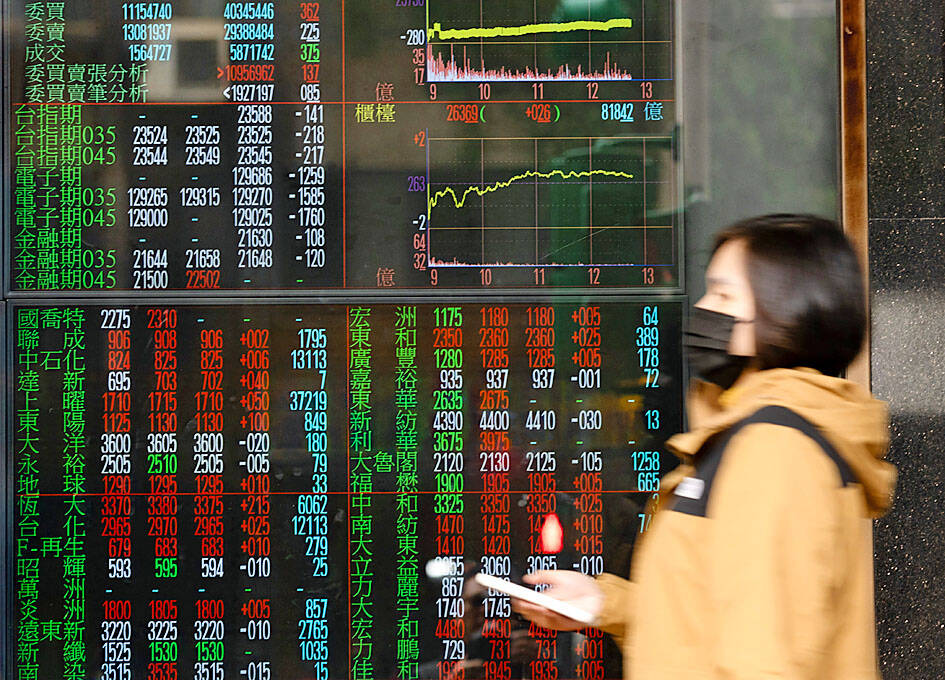Nomura Holdings Inc downgraded Taiwanese equities, citing greater scrutiny of the artificial intelligence (AI) sector and US President Donald Trump’s plans to impose tariffs on trading partners.
Taiwanese stocks were cut to “neutral” from a tactical “overweight” in Nomura’s Asian allocation given “concerns about tariffs, chip sector restrictions, greater AI thematic scrutiny, and elevated valuations and investor positioning,” strategists, including Chetan Seth, wrote in a note on Wednesday.
Taiwan’s equity benchmark has largely remained unchanged this year, with its biggest component — Taiwan Semiconductor Manufacturing Co (TSMC, 台積電) — falling more than 3 percent.

Photo: CNA
That compares with a gain of 3.6 percent in the broader MSCI Asia Pacific Index over the same period.
The TAIEX fell 1.49 percent to 23,053.18 points yesterday, with TSMC dropping 1.89 percent, Taiwan Stock Exchange data showed.
Chinese start-up DeepSeek’s (深度求索) cost-effective AI model — which could rival leading US developers — is raising doubts if companies need to incur significant amounts of capital expenditure to develop such technology. That might weigh on TSMC — the main chip supplier to Apple Inc and Nvidia Corp.
In addition, Trump’s threat of tariffs on semiconductors has complicated Taiwan’s bid to remain a global powerhouse in semiconductor manufacturing and adds pressures on TSMC to move more of its production away from Taiwan.
The company is considering taking a controlling stake in Intel Corp’s factories at the request of Trump administration officials, Bloomberg News reported earlier this month.
Nomura strategists increased their year-end target for the MSCI China Index to 80 from 70, citing renewed investor interest in China’s technological innovation, such as DeepSeek, which “suggests that Chinese equities no longer warrant a deep discount.”
Since returning to the White House on Jan. 20, Trump has imposed a new 10 percent tariff on Chinese goods.
The downgrade comes at a time when China once again unveiled stronger language toward Taiwan, placing further pressure on stocks.

SECTOR LEADER: TSMC can increase capacity by as much as 20 percent or more in the advanced node part of the foundry market by 2030, an analyst said Taiwan Semiconductor Manufacturing Co (TSMC, 台積電) is expected to lead its peers in the advanced 2-nanometer process technology, despite competition from Samsung Electronics Co and Intel Corp, TrendForce Corp analyst Joanne Chiao (喬安) said. TSMC’s sophisticated products and its large production scale are expected to allow the company to continue dominating the global 2-nanometer process market this year, Chiao said. The world’s largest contract chipmaker is scheduled to begin mass production of chips made on the 2-nanometer process in its Hsinchu fab in the second half of this year. It would also hold a ceremony on Monday next week to

TECH CLUSTER: The US company’s new office is in the Shalun Smart Green Energy Science City, a new AI industry base and cybersecurity hub in southern Taiwan US chip designer Advanced Micro Devices Inc (AMD) yesterday launched an office in Tainan’s Gueiren District (歸仁), marking a significant milestone in the development of southern Taiwan’s artificial intelligence (AI) industry, the Tainan City Government said in a statement. AMD Taiwan general manager Vincent Chern (陳民皓) presided over the opening ceremony for the company’s new office at the Shalun Smart Green Energy Science City (沙崙智慧綠能科學城), a new AI industry base and cybersecurity hub in southern Taiwan. Facilities in the new office include an information processing center, and a research and development (R&D) center, the Tainan Economic Development Bureau said. The Ministry

ADVERSARIES: The new list includes 11 entities in China and one in Taiwan, which is a local branch of Chinese cloud computing firm Inspur Group The US added dozens of entities to a trade blacklist on Tuesday, the US Department of Commerce said, in part to disrupt Beijing’s artificial intelligence (AI) and advanced computing capabilities. The action affects 80 entities from countries including China, the United Arab Emirates and Iran, with the commerce department citing their “activities contrary to US national security and foreign policy.” Those added to the “entity list” are restricted from obtaining US items and technologies without government authorization. “We will not allow adversaries to exploit American technology to bolster their own militaries and threaten American lives,” US Secretary of Commerce Howard Lutnick said. The entities

Minister of Finance Chuang Tsui-yun (莊翠雲) yesterday told lawmakers that she “would not speculate,” but a “response plan” has been prepared in case Taiwan is targeted by US President Donald Trump’s reciprocal tariffs, which are to be announced on Wednesday next week. The Trump administration, including US Secretary of the Treasury Scott Bessent, has said that much of the proposed reciprocal tariffs would focus on the 15 countries that have the highest trade surpluses with the US. Bessent has referred to those countries as the “dirty 15,” but has not named them. Last year, Taiwan’s US$73.9 billion trade surplus with the US